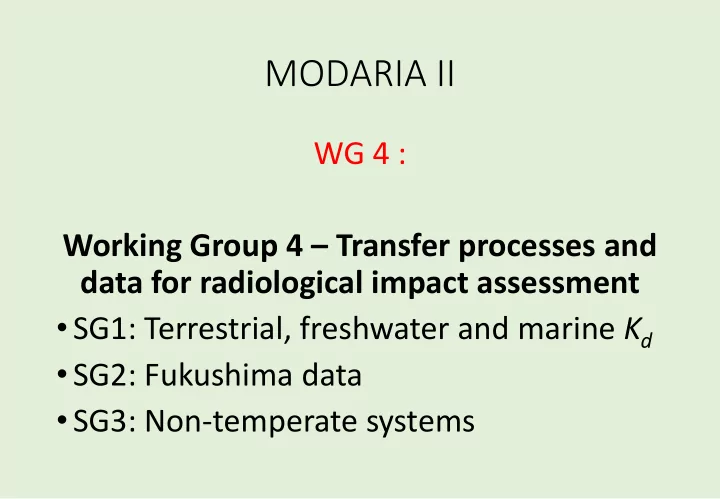

MODARIA II WG 4 : Working Group 4 – Transfer processes and data for radiological impact assessment • SG1: Terrestrial, freshwater and marine K d • SG2: Fukushima data • SG3: Non-temperate systems
Assessing the radiological impact from radioactivity in the environment To adequately quantify the key transfer processes and recognise their limitations in radiological assessments • improve understanding and quantification of key processes The transfer processes and related data will vary depending on the situation considered; • planned, existing and emergency exposure situations • characteristics of the environment • terrestrial, freshwater, marine • temperate or non-temperate systems
WG4: Objectives for three sub groups • To identify key transfer processes for radioactivity in the environment, in the context of the situation under consideration, for use in radiological impact assessment and to provide analysis of key relevant data. Current Focus on K d • To consider the impact of the accidental release from the Fukushima Dai-ichi site in Japan in 2011 and the applicability of existing models and data to the Japanese situation. • To provide advice on the applicability of assessment models to tropical, semi-arid and arid environments.
Relevance to regulatory goals of IAEA Human and environmental radiological protection in situations of regular operational activities and in accidental scenarios. WG4 is working toward: • Strengthening evaluation of the radiological impact by improving the data underpinning the models developed for assessing the transfer of RNs in the environment and the radiological impact • To more appropriately assess exposure levels of the public and in the environment - to ensure an appropriate level of protection from the effects of ionizing radiation, associated with radionuclide releases and from existing radionuclides in the environment
WG 4 report status • Final draft submitted Feb 2018 • Formatted and reviewed • Revision this TM and until end 2018
MODARIA II WG4 Revision and Improvement of K d Values for Terrestrial, Freshwater and Marine Systems ▪ Continued collation and analysis of Kd values incl. Fukushima data ▪ Development of database
Development of global database of K d values • Harmonisation of soil, freshwater and marine data required. • Requires K d data and other relevant meta-data to be collated i.e. information on soil/sediment/seawater etc. • Prototype database developed – testing required.
Review of IAEA MARiS (Marine Information System) Database • Feasibility of using MARiS database as global repository of K d data investigated. • MARiS has the potential to generate K d values. • Ongoing discussions.
WG4 sub-group Collation of environmental transfer parameters after the Fukushima accident (Fukushima parameters) 1 st Interim meeting @ University of Tsukuba, 10-12 July, 2017
WG4 – SG3 Transfer Parameters in Non- temperate Systems
Köppen Geiger climate classification
Groups • 2.1 Group A: Tropical/megathermal climates • 2.1.1 Tropical rainforest climate • 2.1.2 Tropical monsoon climate • 2.1.3 Tropical wet and dry or savanna climate • 2.2 Group B: Dry (desert and semi-arid) climates • 2.3 Group C: Temperate/mesothermal climates • 2.3.1 Mediterranean climates • 2.3.2 Humid subtropical climates • 2.3.3 Oceanic climate • 2.3.4 Highland climates • 2.4 Group D: Continental/microthermal climates • 2.4.1 Hot summer continental climates • 2.4.2 Warm summer continental or hemiboreal climates • 2.4.3 Subarctic or boreal climates • 2.5 Group E: Polar climates
Development of database • newly published or available information in scientific journals / reports • Inputs from member states • Two datasets • Semi-arid and arid (N.Semioschkina, G. Voigt) • Tropical (J. Twining)
Recommend
More recommend